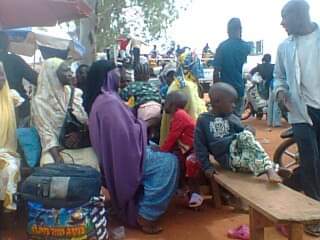With barely a day to the Christmas celebration, motor parks in parts of Kaduna metropolis have witnessed low patronage.
A check by the News Agency of Nigeria (NAN) on Sunday in Kaduna revealed low turn out of passengers at the respective motor parks visited while a number vehicles waited in queue.
Some of the drivers and officials of National Union of Road Transport Workers (NURTW) said the development was due to the high cost of fuel coupled with the economic crunch in the country.
Mr Dauda Ayuba, a commercial driver who operates at Sabo park told NAN that a liter of fuel now costs N675 saying that the situation was rather unbearable for most operators.
“There is fuel almost everywhere but it is too expensive and for us to make ends meet, we have to cope with what we get.
“Usually, on a day to Christmas, the parks would be beehive of activities with passengers trooping in their numbers but today is the opposite,” Ayuba added.
Malam Garba Muhammad, also a commercial driver at central market motor park said he was yet to make a trip to Zaria since he was at the park around 6am.
“In the previous years, I should have made two trips to and from Zaria,” he said.
Malam Hamadu Isa, another commercial driver at Mando park on his part noted that there were more empty vehicles at the park than passengers.
“As you see, some of the drivers are even sleeping I’m their cars because of the cold waiting for passengers.
“It is very obvious that most people won’t travel for the Christmas festivity like they used to,” Isa said.
Mrs Sarah Musa, a civil servant resident at Karji told NAN that in the previous years, she used to travel with her family to her village from Kaduna but the situation had changed.
He said, “The low turnout at the parks is coupled with non-payment of salary to workers as such, most people will observe a low-key celebration.
“People are concerned about what to eat and face other demands that come with the beginning of the year.”
Other motor parks visited by NAN including; Command junction, Mando and Television parks also witnessed the same low turnout of travellers.(NAN)











